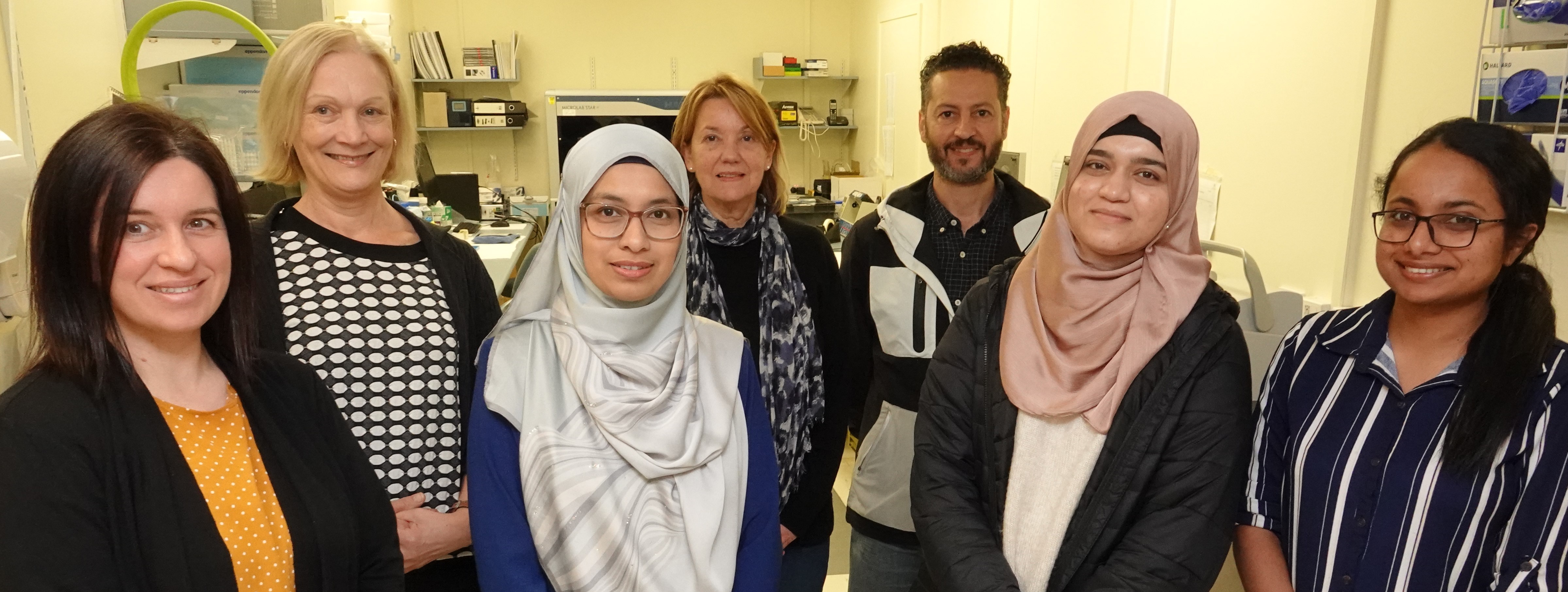Research Program Overview
Chronic myeloid leukaemia (CML) is fatal if untreated. Due to significant advances in drug therapy, patients now sustain long term survival. However, 20-30% of patients fail therapy. Newer, more potent drugs are continually being developed to treat or limit drug resistance. However, these drugs are associated with higher cardiovascular toxicity and have not shown a survival advantage. It is currently not possible to identify patients at the time of diagnosis who are destined to fail therapy. Therefore, it is not possible to determine which patients could benefit from more potent drugs despite the increased risk.
Our research is focussed on the development and clinical evaluation of novel molecular approaches to understand and predict drug resistance for patients with CML. The pace of discovery of resistance mechanisms is now substantially more rapid due to new technology. We can now simultaneously examine hundreds to thousands of genes to find the causes of drug resistance and to identify new drug targets. Working with pharmaceutical companies and monitoring patients enrolled in international clinical trials we aim to discover the molecular factors associated with treatment failure. Our objective is to translate our work into clinical practice to improve risk stratification and enhance therapy decisions for better outcomes for patients with CML.
Current Research Projects
- Defining high risk mutations at diagnosis of CML and at treatment failure.
- Develop enhanced bioinformatic tools and machine learning for improved risk stratification in CML.
- Examine the association between clonal haematopoiesis and late relapse for patients with treatment-free remission.
- Examine complex structural rearrangement of the Philadelphia chromosome to determine if chromoplexy constitutes a new mechanism contributing to drug resistance.
Laboratory staff

Laboratory head
Team Members
Research Assistants
Students
-
Adelina Fernandes
-
Muneeza Maqsood
-
Zuhal Naderi
-
Alia Cibich
Select Recent Publications
- Shanmuganathan N, Yeung D, Wadham C, Fernandes A, Maqsood M, Shahrin N, Saunders V, Kenyon R, Lin M, Toubia J, McConnell J, Kaczorowski D, Ross D, Yong A, Chee L, Shortt J, Viiala N, Braley J, Kok C, Hughes T, Branford S. Impact of ASXL1 at diagnosis in CML patients receiving frontline potent TKIs: high risk of kinase domain mutations. Blood. 2025.
- Branford S, Fernandes A, Shahrin N, Maqsood M, Shanmuganathan N, Wadham C. Beyond BCR::ABL1-The Role of Genomic Analyses in the Management of CML. J Natl Compr Canc Netw. 2024;22(1).
- Shanmuganathan N, Wadham C, Shahrin N, Feng J, Thomson D, Wang P, Saunders V, Kok CH, King RM, Kenyon RR, Lin M, Pagani IS, Ross DM, Yong ASM, Grigg AP, Mills AK, Schwarer AP, Braley J, Altamura H, Yeung DT, Scott HS, Schreiber AW, Hughes TP, Branford S. Impact of additional genetic abnormalities at diagnosis of chronic myeloid leukemia for first-line imatinib-treated patients receiving proactive treatment intervention. Haematologica. 2023;108(9):2380-2395.
- Shanmuganathan N, Wadham C, Thomson D, Shahrin NH, Vignaud C, Obourn V, Chaturvedi S, Yang F, Feng J, Saunders V, Kok CH, Yeung D, King RM, Kenyon RR, Lin M, Wang P, Scott H, Hughes T, Schreiber AW, Branford S. RNA-Based targeted gene sequencing improves the diagnostic yield of mutant detection in chronic myeloid leukemia. The Journal of Molecular Diagnostics. 2022;24(7):803-822.
- Shanmuganathan N, Pagani IS, Ross DM, Park S, Yong ASM, Braley JA, Altamura HK, Hiwase DK, Yeung DT, Kim D-W, Branford S*, Hughes TP*. Early BCR-ABL1 kinetics are predictive of subsequent achievement of treatment-free remission in chronic myeloid leukemia. Blood. 2021;137(9):1196-1207. * Equal senior author.
- Thomson DW, Shahrin NH, Wang PPS, Wadham C, Shanmuganathan N, Scott HS, Dinger ME, Hughes TP, Schreiber AW, Branford S. Aberrant RAG-mediated recombination contributes to multiple structural rearrangements in lymphoid blast crisis of chronic myeloid leukemia. Leukemia. 2020;34(8):2051-2063.
- Branford S, Kim DDH, Apperley JF, Eide CA, Mustjoki S, Ong ST, Nteliopoulos G, Ernst T, Chuah C, Gambacorti-Passerini C, Mauro MJ, Druker BJ, Kim D-W, Mahon F-X, Cortes J, Radich JP, Hochhaus A, Hughes TP. Laying the foundation for genomically-based risk assessment in chronic myeloid leukemia. Leukemia. 2019;33(8):1835-1850.
- Shanmuganathan N, Braley JA, Yong ASM, Hiwase DK, Yeung DT, Ross DM, Hughes TP*, Branford S*. Modeling the safe minimum frequency of molecular monitoring for CML patients attempting treatment-free remission. Blood. 2019;134(1):85-89. * Equal senior author
- Branford S, Wang P, Yeung DT, Thomson D, Purins A, Wadham C, Shahrin NH, Marum JE, Nataren N, Parker WT, Geoghegan J, Feng J, Shanmuganathan N, Mueller MC, Dietz C, Stangl D, Donaldson Z, Altamura H, Georgievski J, Braley J, Brown A, Hahn C, Walker I, Kim SH, Choi SY, Park SH, Kim DW, White DL, Yong ASM, Ross DM, Scott HS, Schreiber AW, Hughes TP. Integrative genomic analysis reveals cancer-associated mutations at diagnosis of CML in patients with high-risk disease. Blood. 2018;132(9):948-961.
- Parker WT, Yeung DTO, Yeoman AL, Altamura HK, Jamison BA, Field CR, Hodgson JG, Lustgarten S, Rivera VM, Hughes TP, Branford S. The impact of multiple low-level BCR-ABL1 mutations on response to ponatinib. Blood. 2016;127(15):1870-1880.
- Deininger MW, Hodgson JG, Shah NP, Cortes JE, Kim D-W, Nicolini FE, Talpaz M, Baccarani M, Müller MC, Li J, Parker WT, Lustgarten S, Clackson T, Haluska FG, Guilhot F, Kantarjian HM, Soverini S, Hochhaus A, Hughes TP, Rivera VM, Branford S. Compound mutations in BCR-ABL1 are not major drivers of primary or secondary resistance to ponatinib in CP-CML patients. Blood. 2016;127(6):703-712.
- Cross NC, White HE, Ernst T, …….. Hochhaus A, Branford S. Development and evaluation of a secondary reference panel for BCR-ABL1 quantification on the International Scale. Leukemia. 2016;30(9):1844–1852.
- Branford S. Molecular monitoring in chronic myeloid leukemia—how low can you go? ASH Education Program Book. 2016;2016(1):156-163.



